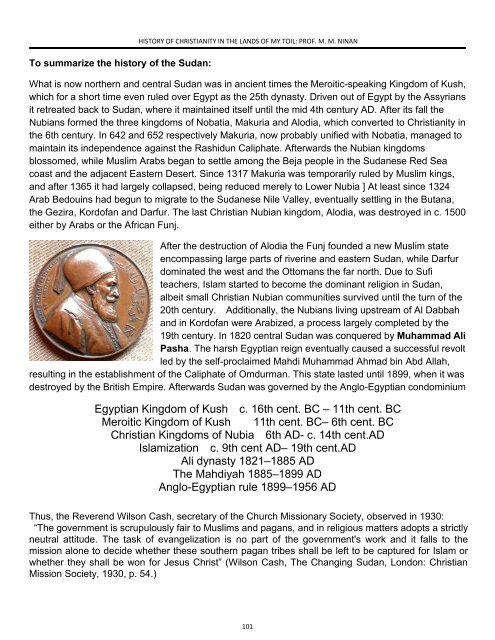Historyof Christianity in the lands of My Toil
You also want an ePaper? Increase the reach of your titles
YUMPU automatically turns print PDFs into web optimized ePapers that Google loves.
To summarize <strong>the</strong> history <strong>of</strong> <strong>the</strong> Sudan:<br />
HISTORY OF CHRISTIANITY IN THE LANDS OF MY TOIL: PROF. M. M. NINAN<br />
What is now nor<strong>the</strong>rn and central Sudan was <strong>in</strong> ancient times <strong>the</strong> Meroitic-speak<strong>in</strong>g K<strong>in</strong>gdom <strong>of</strong> Kush,<br />
which for a short time even ruled over Egypt as <strong>the</strong> 25th dynasty. Driven out <strong>of</strong> Egypt by <strong>the</strong> Assyrians<br />
it retreated back to Sudan, where it ma<strong>in</strong>ta<strong>in</strong>ed itself until <strong>the</strong> mid 4th century AD. After its fall <strong>the</strong><br />
Nubians formed <strong>the</strong> three k<strong>in</strong>gdoms <strong>of</strong> Nobatia, Makuria and Alodia, which converted to <strong>Christianity</strong> <strong>in</strong><br />
<strong>the</strong> 6th century. In 642 and 652 respectively Makuria, now probably unified with Nobatia, managed to<br />
ma<strong>in</strong>ta<strong>in</strong> its <strong>in</strong>dependence aga<strong>in</strong>st <strong>the</strong> Rashidun Caliphate. Afterwards <strong>the</strong> Nubian k<strong>in</strong>gdoms<br />
blossomed, while Muslim Arabs began to settle among <strong>the</strong> Beja people <strong>in</strong> <strong>the</strong> Sudanese Red Sea<br />
coast and <strong>the</strong> adjacent Eastern Desert. S<strong>in</strong>ce 1317 Makuria was temporarily ruled by Muslim k<strong>in</strong>gs,<br />
and after 1365 it had largely collapsed, be<strong>in</strong>g reduced merely to Lower Nubia ] At least s<strong>in</strong>ce 1324<br />
Arab Bedou<strong>in</strong>s had begun to migrate to <strong>the</strong> Sudanese Nile Valley, eventually settl<strong>in</strong>g <strong>in</strong> <strong>the</strong> Butana,<br />
<strong>the</strong> Gezira, Kord<strong>of</strong>an and Darfur. The last Christian Nubian k<strong>in</strong>gdom, Alodia, was destroyed <strong>in</strong> c. 1500<br />
ei<strong>the</strong>r by Arabs or <strong>the</strong> African Funj.<br />
After <strong>the</strong> destruction <strong>of</strong> Alodia <strong>the</strong> Funj founded a new Muslim state<br />
encompass<strong>in</strong>g large parts <strong>of</strong> river<strong>in</strong>e and eastern Sudan, while Darfur<br />
dom<strong>in</strong>ated <strong>the</strong> west and <strong>the</strong> Ottomans <strong>the</strong> far north. Due to Sufi<br />
teachers, Islam started to become <strong>the</strong> dom<strong>in</strong>ant religion <strong>in</strong> Sudan,<br />
albeit small Christian Nubian communities survived until <strong>the</strong> turn <strong>of</strong> <strong>the</strong><br />
20th century. Additionally, <strong>the</strong> Nubians liv<strong>in</strong>g upstream <strong>of</strong> Al Dabbah<br />
and <strong>in</strong> Kord<strong>of</strong>an were Arabized, a process largely completed by <strong>the</strong><br />
19th century. In 1820 central Sudan was conquered by Muhammad Ali<br />
Pasha. The harsh Egyptian reign eventually caused a successful revolt<br />
led by <strong>the</strong> self-proclaimed Mahdi Muhammad Ahmad b<strong>in</strong> Abd Allah,<br />
result<strong>in</strong>g <strong>in</strong> <strong>the</strong> establishment <strong>of</strong> <strong>the</strong> Caliphate <strong>of</strong> Omdurman. This state lasted until 1899, when it was<br />
destroyed by <strong>the</strong> British Empire. Afterwards Sudan was governed by <strong>the</strong> Anglo-Egyptian condom<strong>in</strong>ium<br />
Egyptian K<strong>in</strong>gdom <strong>of</strong> Kush c. 16th cent. BC – 11th cent. BC<br />
Meroitic K<strong>in</strong>gdom <strong>of</strong> Kush 11th cent. BC– 6th cent. BC<br />
Christian K<strong>in</strong>gdoms <strong>of</strong> Nubia 6th AD- c. 14th cent.AD<br />
Islamization c. 9th cent AD– 19th cent.AD<br />
Ali dynasty 1821–1885 AD<br />
The Mahdiyah 1885–1899 AD<br />
Anglo-Egyptian rule 1899–1956 AD<br />
Thus, <strong>the</strong> Reverend Wilson Cash, secretary <strong>of</strong> <strong>the</strong> Church Missionary Society, observed <strong>in</strong> 1930:<br />
“The government is scrupulously fair to Muslims and pagans, and <strong>in</strong> religious matters adopts a strictly<br />
neutral attitude. The task <strong>of</strong> evangelization is no part <strong>of</strong> <strong>the</strong> government's work and it falls to <strong>the</strong><br />
mission alone to decide whe<strong>the</strong>r <strong>the</strong>se sou<strong>the</strong>rn pagan tribes shall be left to be captured for Islam or<br />
whe<strong>the</strong>r <strong>the</strong>y shall be won for Jesus Christ” (Wilson Cash, The Chang<strong>in</strong>g Sudan, London: Christian<br />
Mission Society, 1930, p. 54.)<br />
101

















